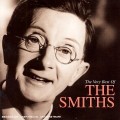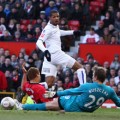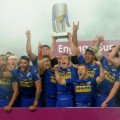Scandal FC: When Leeds United Cracked
The final part of Robert Endacott's Dirty Leeds trilogy is a painful reminder of the insanity that filtered down from the LUFC boardroom.
Acquainted as Leeds fans are with ritual masochism, it is perhaps no surprise that a good number of Leeds United-related tomes comb over the rancid carcass of our many darker moments. Certainly there is no shortage of source material and the essence of this embittered club is as much built on epic and often soured failure as it is on unfettered magnificence.
Leeds United is a club shrouded in belligerent resentment; peel away each layer and there is another generation of fans absorbed in grievance and antipathy. Pick your target. Scarred by decades of grudges with varying degrees of justification, Leeds United peers at the rest of the football world like an urchin child emerging from years in a coal mine; blinking in the light, its’ eyes programmed only to view with suspicion and disdain, hamstrung by mistrust, because it has known little else.
Through wartime mis-payments and undermining fixture scheduling, to offside atrocities and refereeing bribery scandals, there are few ugly ogres of the game that Leeds United’s fingers have not lightly dabbled with. For better or worse, where a story of Leeds United must be described as ‘warts and all’, the writer will be hard pushed to see passed the forest of benign growths that besmirch the otherwise celestial visage. Whilst Leeds have rarely emerged from football’s various forms of mistreatment with any credit, whether they were the perpetrator or the victim, it is perhaps no surprise that the dark forces staining the pristine white of the club’s shirts and hovering over Elland Road like a fog of chloroform, intrigue those of a literary mind as much as the grace of Charles, the leadership of Bremner and the passion of Strachan.
So from this dissident perspective comes Robert Endeacott’s Scandal FC, the third book in the ‘Dirty Leeds’ trilogy. This series of books has variously covered the stunning yet tainted ascendancy of Revie’s dirty-faced angels, the club’s plight in continuing that legacy, and finally this; a resentful trudge through the excesses and mis-management of the Peter Ridsdale era, where Leeds United turned wholesome zeal into disagreeable pomposity, as if designing a checklist of everything a football fan should dislike about the modern game.
There are few features or protagonists from the Ridsdale era that emerged unblemished from a period of flatulent self-regard, save for the likes of Radebe, Matteo or Eddie Gray, all still indelibly linked to the club today. Much of the personnel appeared hell bent on a campaign to cheapen and mis-use something that had been perfectly placed to embellish the football world with a purified finesse barely seen since the Busby Babes. What followed was an object lesson in how deceit, delusion and dishonour can fester unopposed to rip the heart out of the most capacious of behemoths.
Scandal FC uses the rampant misconduct of the 2002/03 season as its main narrative, describing each game and the soap opera that went on in between them. It also neatly intertwines the story of that particularly hard-to-stomach season with Leeds United’s various other immoral wrongdoings of the era, which delivered debilitating PR blows like a Stan Boardman after-dinner speech, except, one such muddy transgression was actually a Stan Boardman after-dinner speech. Honestly.
With Scandal FC bookended in the present, Robert also continues the ongoing simultaneous story of Jimmy O’Rourke, as the narrator of Leeds’ many travails which combine with his own hardships in duelling with the onset of alcoholism, the troubles of being a step-parent and the relationship with his wife. O’Rourke is a former Leeds United trainee, steeped in Revie reverence, now working on the Elland Road ground staff and is a character inspired by Leeds United’s former groundsman John Reynolds and Robert’s own father, Barry, who also worked on the staff at Elland Road for many decades.
With Ridsdale’s sacking of David O’Leary in 2002 heralding the externally-conspicuous decline of the club, perpetuated by the Gerry Cottle-inspired hiring of Terry Venables as manager, the book takes us through the frequent trauma of the 2002/03 season, described in painstaking detail, and guaranteed to have Leeds fan’s a*ses twitching with fresh tribulation, as if it was only twelve weeks ago, not twelve years. Raking over the coals again, it seems inconceivable that so many crude mistakes, personality clashes, narcissistic hissy fits and convulsions of simple, outrageous bad fortune could conspire against one football club. But it was a very real slow-motion car crash played out twice weekly to an adoring audience of millions. It did happen.
More…
Leeds United Fans: Seen This Robbie Fowler Skit? (You Probably Paid For It)
Chris Kamara On Leeds, Missing Speedo & Gatecrashing Vinnie Jones
Scandal FC includes a series of sage observations about Ridsdale’s brand of Football Monopoly that many fans of the time were muttering sheepishly, either to themselves or quietly behind a cupped hand to a chosen one. Prior to the graphically bloody implosion of the 2002/03 season, it was not the done thing to openly dispute the wisdom of signing Keane, Fowler and Johnson or question the club’s methods and the body language or attitude of the ‘crown jewels’ such as Kewell, Bowyer, Viduka or Woodgate. Whilst results on the pitch were progressive, which, until roughly December 22nd 2001, they were, all seemed well and we would put up with the trial and the drink-driving arrests, and the £18 million-we-didn’t-have spunked on a centre half, and Alan Smith’s ludicrous disciplinary problems, and the ‘kooky’ desire to have a Leeds United Grand Prix team. We were brainwashed by ‘success’ to believe these were natural things for a ‘successful’ football club to do; our unease and discomfort was pacified by Ridsdale’s ubiquitous grin, which gradually turned from spontaneous and wholesome, to pained and frankly f*cking irritating. Then we were told it was a collaborative ‘dream’ that we were all privy to, as if we were all responsible for player recruitment, budgeting, man-management, Ian Harte’s painful loss of form, the players’ official code of conduct and the sourcing of £60million based on the fragile premise of ongoing Champions League qualification.
What Scandal FC does perfectly is convey the anxiety that seeped through most free-thinking and articulate fan’s minds. As new words entered our everyday lexicon like ‘amortisation’, we unravelled the potential consequences of the club’s collective actions and cast our minds forward to envisage, well, pretty much exactly the torrid and humiliating journey we have traversed over the last ten years. In addition to this, the book couples the insane excesses of the Ridsdale period with the genuine fan’s bar room reaction; alien, as we are, to the ‘other’ world that footballers now inhabit. Musings over a post-match pint develop into fantasies soaked in regret, and hallucinations over what has been and what should have been. We’ve all been there, some more than others, some deeper than others, but Scandal FC speaks for every Leeds fan as it glances scornfully at the sorry mess we were left in. Naturally, also, for any Leeds United book entitled ‘Scandal FC’, the name Ken Bates cannot escape some scrutiny though this is prudently not overdone. Robert’s passage describing how Bates “disenfranchised us, jeopardised us and denniswised us” neatly sums up the eight years of tyranny Leeds fans have only just been unshackled from.
We should be particularly grateful to Robert Endeacott for the painful research he has carried out in piecing together the story of the 2002/03 season, and the book contains revelations I was not previously aware of. Most notably, we should be grateful to Robert for ridding us of the need to absorb Peter Ridsdale’s autobiography, because in it, presumably, are the details of his evidently strained relationship with David O’Leary, his doubts from the start about hiring Terry Venables and his covert courtship of Martin O’Neill. This resulted in a ‘pre-nup’ agreement whereby O’Neill would become Leeds’ manager in the summer of 2003, but only if Ridsdale remained as chairman. Evidently, Ridsdale’s skin was not thick enough and the best chance of arresting Leeds’ accelerating decline was gone when he walked away.
Reading Scandal FC does raise many questions, some even that you haven’t cogitated continuously for the last ten years, as you stand frozen in misery on a wet terrace in Histon. You could question why Robert has chosen just the 2002/03 season to dissect, but frankly, life is too short to pick the holes in everything else, and the key sequence of events that combined to bring about Leeds’ Devon Loch pastiche are adequately exposed herein, thanks very much. You could also question the relevance of the simultaneous Jimmy O’Rourke story, particularly if you were reading this book in isolation, having not read the previous two. But the character, despite being difficult to warm to, adds a context that works well, and while it reads like a grumpy old man bitter about modern football, his thoughts and observations are alarmingly close to our own.
As Leeds fans continue to survey the wreckage of the ‘Ridsdale Years’ and as they ponder how acutely darker and disorientating the nightmare became for them, it is somehow just about possible to read about the events around the turn of the Millennium with some objectivity. The constant impression that someone was being deceitful and lying still rankles, Venables ostracising Batty and Dacourt like lepers still rankles, the crippling financial deficits in value we took on selling Dacourt, Bowyer, Keane, Woodgate, Kewell, Viduka, Robinson, Fowler, Carson, Lennon and Milner still rankle, the cancerous greed and egomania that ruptured a forceful and magnetising institution heading in the right direction still rankles. But Scandal FC somehow brushes all that aside and leaves the one constant, the fans, still living and breathing. We might be dishevelled, washed up on the shore gasping for breath, and seeking solace in life’s everyday aggravations to escape the drill-to-the-head conundrum of Leeds United, but we will survive it. The best thing about Scandal FC is that you know how the story ends, or at least, to ignore the depressing inevitability and foster the survivor’s instinct; you know that the story will never have an end.
Scandal FC is available as an ebook from author Robert Endeacott’s website here.
Watch the Scandal FC trailer here.


 RELATED
RELATED








 COMMENTS
COMMENTS